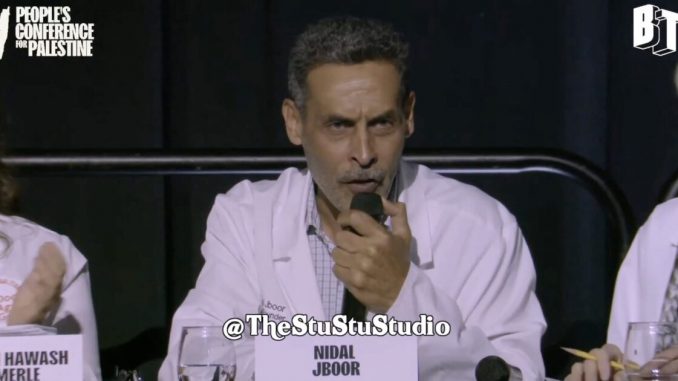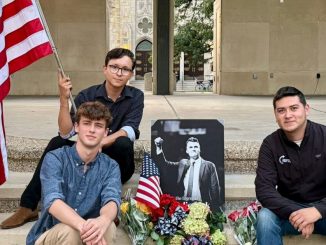
Nidal Jboor at the People’s Conference for Palestine in Detroit, August 2025. (Screenshot: BreakThrough News / Youtube)
| Published September 2, 2025
Detroit, MI — September 2025
The second annual People’s Conference for Palestine in Detroit was intended to showcase solidarity and highlight the Palestinian cause. Instead, it drew headlines for all the wrong reasons when a featured speaker allegedly called for the assassinations of Western political leaders opposed to Palestinian statehood.
The speaker, identified as Nidal Jboor—a Palestinian activist with a history of protest at the U.S. Capitol—delivered remarks urging that certain leaders be “locked up, taken out, neutralized.” Though framed as a defense of “the children” and “humanity,” the rhetoric sparked immediate backlash, with critics warning that such language amounted to incitement to violence.
A Controversial Stage
The Detroit gathering was billed as a grassroots platform to uplift Palestinian voices, but it quickly became embroiled in controversy. The inclusion of speakers with histories tied to violence or radical politics drew scrutiny even before the conference began.
Central to the criticism was Nidal Jboor, whose fiery remarks about “taking out” Western leaders opposed to Palestinian statehood ignited outrage online. His words were widely circulated across social media, where opponents described them as blatant incitement. Supporters, however, attempted to frame his speech as metaphorical—a passionate plea against policies seen as oppressive rather than a literal call to arms.
Adding to the tension was the participation of Hussam Shaheen, a former head of Fatah Youth in Jerusalem. Convicted in 2004 of attempted murder and conspiracy, Shaheen was only released in February 2025 during a controversial hostage-prisoner exchange. His appearance in Detroit was condemned by critics as evidence that the conference was providing a platform to individuals with a track record of endorsing or engaging in violence.
These controversies fueled criticism that the conference risked alienating moderate supporters of Palestinian rights. Instead of focusing on humanitarian issues or calls for diplomacy, much of the media attention shifted toward the radical elements on stage. For organizers, this created an uphill battle: defending free expression and solidarity while fending off accusations that the event endorsed extremism.
Political Fallout in Michigan
The uproar from the Detroit conference has landed squarely in the middle of Michigan’s already charged political climate. With one of the largest Arab-American populations in the United States, particularly concentrated in Dearborn and Metro Detroit, the state has long been a focal point for debates over U.S. policy in the Middle East.
Republican leaders quickly seized on the remarks. GOP Senate candidate Mike Rogers condemned the conference, arguing that giving a stage to figures like Nidal Jboor and Hussam Shaheen shows how “radical elements are infiltrating American political discourse.” He called on federal authorities to investigate the event and accused Democrats of turning a blind eye to extremism.
Democrats, however, face a delicate balancing act. Many within their base—especially younger voters and Arab-American communities—strongly support the Palestinian cause. Yet aligning too closely with events clouded by rhetoric of violence risks alienating moderates and fueling Republican attacks in swing districts. Michigan’s Democratic leadership has so far issued cautious statements, distancing themselves from the conference while stopping short of condemning Palestinian activism outright.
The controversy also comes at a sensitive time ahead of the 2026 midterm elections. Michigan, a perennial battleground state, could see its Senate and House races influenced by how candidates handle the fallout. For Republicans, the issue is an opportunity to frame themselves as defenders of national security. For Democrats, it is a test of whether they can maintain support among Arab-American voters without appearing soft on extremism.
Locally, community leaders in Dearborn expressed frustration that the rhetoric of one or two speakers risks overshadowing decades of peaceful activism. They warn that the controversy may deepen polarization and unfairly stigmatize Arab-American communities already under political and media scrutiny.
In short, the Detroit conference has become more than just a gathering—it has turned into a political flashpoint in Michigan, shaping narratives that could ripple far beyond the state’s borders.
International Repercussions
The Detroit conference didn’t just trigger domestic controversy—it also carried weight abroad. For Israel, the rhetoric provided fresh ammunition in its long-running argument that Palestinian advocacy in the West often overlaps with extremist agendas. Israeli officials and pro-Israel groups in Washington are likely to cite Nidal Jboor’s alleged calls for assassinations as proof that Palestinian solidarity movements are not merely about human rights, but tied to dangerous ideologies. This could strengthen lobbying efforts for tighter U.S. restrictions on pro-Palestinian organizations.
For the Palestinian cause, the fallout is more complicated. Advocates worry that incendiary language risks overshadowing legitimate grievances, such as displacement, military occupation, and humanitarian crises in Gaza and the West Bank. When voices associated with violence dominate the stage, it makes it harder for peaceful activists to gain traction with Western audiences who might otherwise sympathize with calls for statehood and self-determination.
Diplomatically, the controversy comes at a time of already strained relations between the U.S. and Middle Eastern partners. The Biden administration has tried to balance unwavering support for Israel’s security with carefully managed outreach to Arab states. Incidents like this could force Washington into a firmer stance, either by condemning extremist rhetoric more forcefully or by risking criticism for appearing to stifle free speech.
Meanwhile, adversaries such as Iran and its allied groups could seek to capitalize on the backlash, portraying the U.S. as hypocritical—supporting freedom of speech at home until it involves criticism of Israel. That narrative, if amplified, could deepen mistrust in the region and complicate U.S. diplomacy.
Ultimately, what unfolded in Detroit may have limited practical impact on foreign policy decisions, but symbolically it reinforces the fragility of the Palestinian movement’s image on the global stage. When a solidarity conference in America sparks headlines about assassination rhetoric, it becomes harder for international audiences to separate the cause from the controversy.
The Line Between Speech and Threat
At the heart of the Detroit controversy lies a fundamental legal and constitutional question: where does free speech end, and where does a criminal threat begin?
The First Amendment protects even the most unpopular, offensive, or inflammatory speech. Over the decades, the U.S. Supreme Court has consistently ruled that mere advocacy—even of violence in the abstract—does not automatically strip speech of constitutional protection. For instance, in Brandenburg v. Ohio (1969), the Court held that speech urging violence is protected unless it is “directed to inciting or producing imminent lawless action and is likely to incite or produce such action.”
But Jboor’s alleged statements—calling for leaders to be “locked up, taken out, neutralized”—push into murkier territory. If law enforcement or prosecutors interpret these remarks as a “true threat” rather than political hyperbole, they could fall outside the First Amendment’s shield. Courts have defined “true threats” as serious expressions of intent to commit unlawful violence against particular individuals or groups. Unlike abstract slogans, they are viewed as credible enough to instill fear or risk prompting actual violence.
In practice, much depends on context:
-
Specificity – Were actual names or offices of leaders targeted, or was the language broad and rhetorical?
-
Audience – Was the call made to a crowd likely to act on it, or to an audience that understood it as symbolic rhetoric?
-
Pattern of Speech – Does the speaker have a history of advocating violence, or was this a one-time outburst?
If prosecutors can argue that Jboor’s remarks created a clear and present danger, charges such as incitement, making threats, or providing material support to extremist groups could follow. On the other hand, a defense could argue that the speech was figurative, taken out of context, or part of a broader tradition of fiery political rhetoric.
Beyond the courtroom, this legal gray zone fuels public debate. Supporters of free speech warn that criminalizing activist rhetoric risks setting a precedent that chills dissent. Opponents counter that turning a blind eye to violent language opens the door to radicalization and potential attacks.
What happened in Detroit is more than a flashpoint about Palestine—it is also a test of America’s commitment to balancing liberty with security, a balancing act that has defined U.S. debates since 9/11.
 Implications
Implications
🔎 Political Implications
-
National Security Concern: Calls for assassinations—even rhetorical—are taken seriously. Federal agencies (FBI, DHS) may investigate speakers and organizers, which could result in surveillance, arrests, or even charges.
-
Impact on Michigan Politics: Michigan has a large Arab-American community (notably in Dearborn). Politicians are caught between condemning extremist rhetoric and respecting legitimate concerns about Palestine. Candidates like Mike Rogers (GOP Senate candidate) are already seizing this to paint Democrats as “soft on extremism.”
-
2026 Elections: Expect this story to be weaponized by political campaigns as part of the narrative around domestic extremism and Middle East policy.
🌍 International Implications
-
Israel–U.S. Relations: Violent rhetoric from U.S. soil may strengthen Israel’s case that Palestinian activism is tied to extremism. Israeli officials could pressure Washington to crack down harder on pro-Palestinian groups.
-
Palestinian Cause: Extremist messaging risks undermining broader support in the West, especially when tied to violent language instead of diplomacy.
-
Radicalization Risks: Such rhetoric could embolden lone actors or extremist sympathizers, both domestically and abroad.
📰 Media & Public Perception
-
Divisive Coverage: Right-leaning outlets (e.g., Gateway Pundit) highlight the “terrorist rhetoric” angle, while left-leaning or activist outlets may frame it as exaggerated or taken out of context.
-
Polarization: This fuels the ongoing split between those who see Palestine advocacy as a civil rights issue versus those who see it as a cover for extremism.
-
Censorship Debate: Platforms like YouTube may face pressure to remove or flag videos of the event, sparking free-speech vs. safety debates.
⚖️ Legal Implications
-
First Amendment Boundaries: The U.S. protects even unpopular speech, but direct incitement to violence crosses into illegality (per Supreme Court rulings like Brandenburg v. Ohio). If Jboor’s words are deemed a true threat, charges could follow.
-
Conference Organizers: They may face legal scrutiny if it’s shown they knowingly platformed individuals encouraging violence.
-
Foreign Influence: If attendees have links to foreign groups designated as terrorist organizations, the Justice Department could pursue material support charges.
 Overall Takeaway:
Overall Takeaway:
The People’s Conference for Palestine in Detroit has become a flashpoint where passionate activism collided with rhetoric that crossed into dangerous territory. The alleged calls for assassinations by speaker Nidal Jboor highlight the thin line between free speech and incitement to violence—raising alarms for law enforcement, politicians, and community leaders alike.
While organizers framed the gathering as a platform for Palestinian solidarity, the inflammatory language risks undermining legitimate advocacy by feeding into narratives of extremism. Politically, it’s certain to be weaponized in upcoming elections, shaping debates not only about U.S. foreign policy toward Israel and Palestine but also about national security and the limits of free expression at home.
In the end, the conference may be remembered less for solidarity and more for the controversy it sparked—an episode showing how rhetoric, when unchecked, can ripple far beyond the stage, fueling polarization in America and straining an already volatile international issue.





Be the first to comment